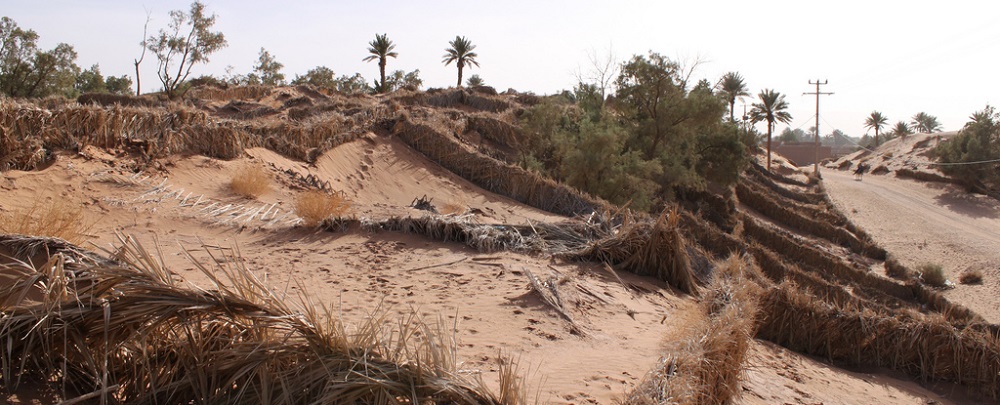
Desertification management in Tinfu, Morocco. Photo: Richard Allaway.
The UN Food and Agriculture Organization estimates that by 2030, Africa will lose two-thirds of its arable land if desertification is not stopped. Desertification exacerbates the effects of climatic and political crises in countries where livelihoods and incomes rely on agriculture. Sixty-five percent of Africa’s labor force works in the agricultural sector.
Studies on the desertification of the Sahel and its impact on the livelihoods of people living in the region show that the problem is widespread and getting worse. A region covering parts of Ethiopia, Somalia, and Kenya is now into its third year of drought which has severely impeded any attempts at recovery and left 12.8 million people food insecure and vulnerable to outbreaks of disease. Southern Africa, too, is in the middle of a 50-year-long drying trend as a result of substantial warming of the Indian Ocean. The UN predicts that in 2017, almost 15 million Southern Africans will be seriously affected by drought.
While most famine in Africa is a result of conflict, experts predict that food and water shortages caused by climate change will exacerbate resource competition and state failure, which in turn will perpetuate the cycle of hunger and violence.
Africa Center Experts
- Joseph Siegle, Director of Research
- Raymond Gilpin, Dean of Academic Affairs
Additional Resources
- Africa Center for Strategic Studies, “Conflict and Famine in South Sudan,” Infographic, March 20, 2017.
- Africa Center for Strategic Studies, “Acute Food Insecurity and Conflict in Africa,” Infographic, February 17, 2017.
- Kaley Fulton and Benjamin Nickels, “Africa’s Pastoralists: A New Battleground for Terrorism,” Spotlight, January 11, 2017.
- Africa Center for Strategic Studies, “Selected Effects of Climate Change on Africa,” Infographic, November 17, 2016.
- Africa Center for Strategic Studies, Videos: Environment and Security.
- University of Texas at Austin, “Climate Change and Security in Africa: Clear Risks, Nuanced Impacts,” December 2014.
- International Food Policy and Research Institute, “The Economics of Desertification, Land Degradation, and Drought,”
- Organization for Economic Cooperation and Development, “Security Implications of Climate Change in the Sahel,”
- UN Food and Agriculture Organization, “Sustainable Development of Drylands and Combating Desertification,”
More on: Environment and Security Food Security

